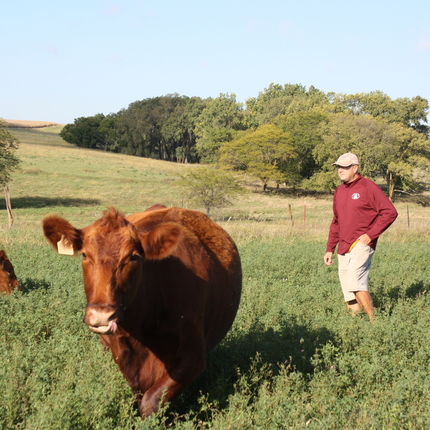To learn more, check out the Conservation Innovation Grants Farmer Mentor Case Study: Del Ficke. Cora Fox contributed to this blog.
Though Del Ficke had an established career in the health care industry, his heart was always back home on the family farm.
The draw of wide open spaces and working with livestock was too much to resist. So, for 30 years, Del has made agriculture his priority, and takes pride in managing Ficke Cattle Company in Pleasant Dale, Nebraska.
A fifth generation producer, Del has downsized the once 7,000 acre farm to focus on conservation and livestock. Ficke Cattle Company is approximately 600 acres, with row crops and cover crops, as well as pasture for livestock, which includes 70 head of cattle/replacement heifers.
Del has no formal agricultural education or training, but he has learned through experience, much of it from working with his father. Growing up, Del was exposed to a variety of agricultural practices.
“My dad was very ‘forward-thinking,’” said Del. “He hosted farm tours to share what we were doing on the farm with others. He also traveled and learned from producers all over the country.”
Del has taken everything he’s learned over the years and is passing it along to his children, as they are also involved in the family operation. His message to the next generation is to be mindful of what you want out of this industry, and work hard to make it happen.
“The work you do everyday means nothing if you aren’t prepared,” said Del. “Start at your goal, and work your way back. Think about what you want to accomplish.”
Conservation is a key component of Del’s agricultural philosophy, and he applies those practices around the operation wherever he can. For decades, Del has utilized no-till, and cover crops through the Environmental Quality Incentives Program (EQIP). Intensive grazing and a pollinator habitat are also incorporated on his land.
“If every farmer made a 10 percent change, the landscape would greatly improve,” said Del. “Small changes yield big results.”
Del feels conservation affects more than just the farmers utilizing those practices, and the time to act is now.
“We’re revisiting all the things we did 100 years ago,” he said. “My generation is of no consequence. If the way we farm isn’t changed in the next decade, we’re out of time.”
In addition to utilizing conservation practices on the land, Ficke Cattle Company hosts a unique breed of cattle—the Graze Master—to help with those practices. Developed by the Fickes, herd genetics can be traced back 50 years. This breed of cattle is forage-based, meaning they do not rely on grain as their main source of feed.
In everything he does, Del’s main goal is keeping land sustainable, and he urges others in agriculture to consider the importance of healthy land for future generations.
“Our time to make a difference is running out,” said Del. “If you need a permit to amend your soil, it’s probably not the right thing to do. Conservation has to be important to all farmers.”





